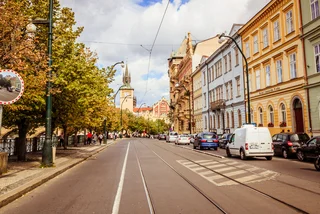Traffic fell significantly in most cities in 2020 due to the coronavirus, and Prague was no exception, according to data from Dutch traffic technology firm TomTom.
In the 10 years that the firm has monitored live traffic in its traffic index, numbers have gone up in most cities. In 2020, though, in the 416 cities surveyed in 57 countries, traffic fell in 387 and rose in 13.
Compared to other cities, Prague was the 137th most congested in the world and 84th most congested in Europe. The average congestion level in 2020 was 24 percent, meaning that a 30 minute trip would take 24 percent longer than when there is a free flow of traffic.
The city also say 51 days with low traffic, primarily clustered during the most severe restrictions in March, April, and May. The worst day for traffic in Prague in 2020 was Sept. 29, with 59 percent congestion, and overall September was the most congested month.
Despite, the drop in traffic, commuters during 2020 lost an extra 3 days and 22 hours due to traffic jams, but this was 1 day and 10 hours lass than in 2019, according to TOmTom's index.
The live traffic situation in Prague and any of the monitored cities can be found on the TomTom website on the same page as the details on the annual ranking.
“2020 was a year like no other, changing the way we lived, worked and moved. … City centers became ghost towns after countries worldwide locked down. Peak hour traffic dwindled as we swapped the daily commute for working from home,” the TomTom team said on its blog.
But there were times when traffic increased significantly, when new lockdown measures were announced.
“It was really striking to see the mass exodus of people from capitals across Europe when new lockdowns were announced, and how that was reflected in the traffic,” the TomTom team said
“The day before Greece’s second lockdown was the most congested day in Athens in 2020. Meanwhile, in Paris, we saw traffic jams reach a record length of 700km on the day before the city introduced new lockdown measures,” they added.
One of TomTom’s goals is to make roads safer and air cleaner by promoting changes in traffic patterns. On their website, they ask what would happen if COVID-19 permanently changed how people commute.
“We'll no longer waste hours stuck in traffic as working from home will became the norm for most jobs. Rush hour traffic will all but disappear, making journeys faster and less stressful,” The website states.
But that is far from certain. “We’re working from home more. We’re traveling less often, and our trips are shorter. We’re using more online shopping and food delivery services. However, it’s hard to predict whether these trends will stick around. We can only keep looking at the data and follow the changes as they unfold,” the TomTom team said on its blog.
Founded in 1991 and headquartered in Amsterdam. TomTom is a multinational creator of location technology and consumer electronics.












 Reading time: 2 minutes
Reading time: 2 minutes 




























